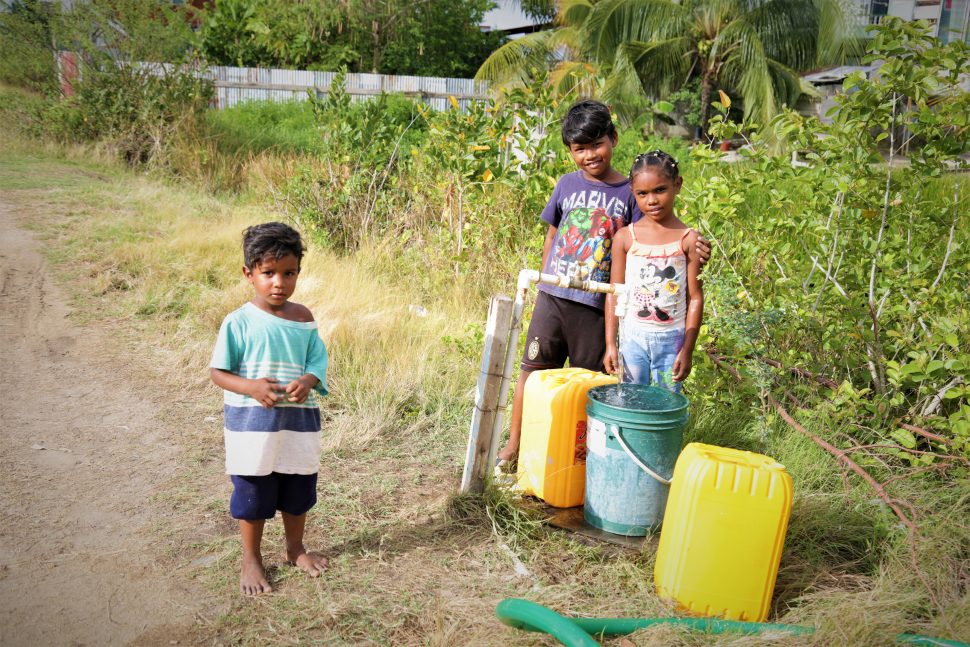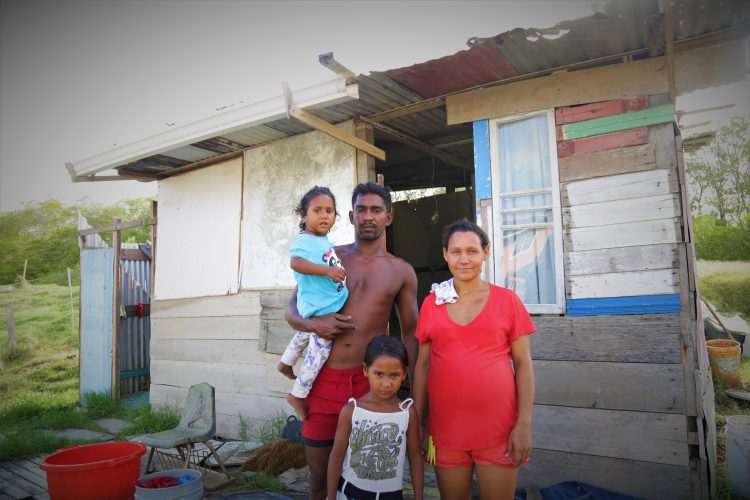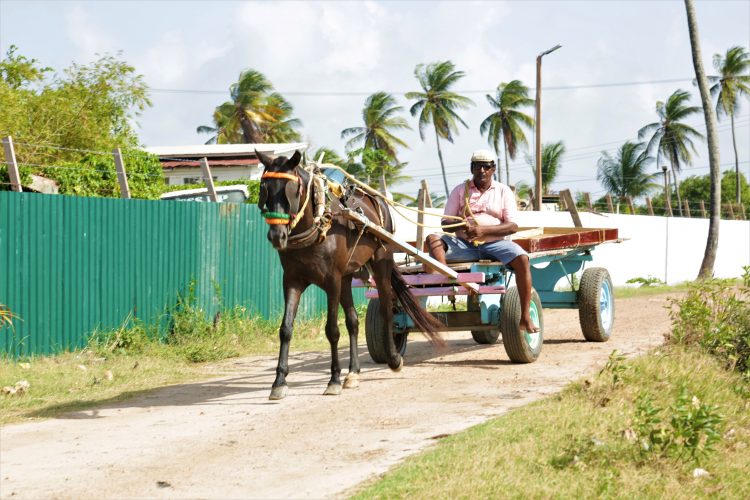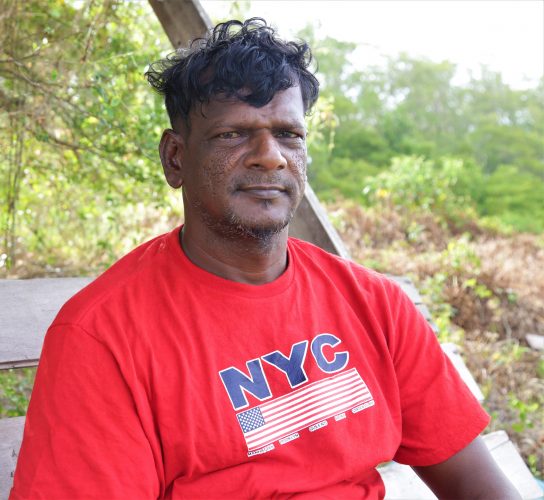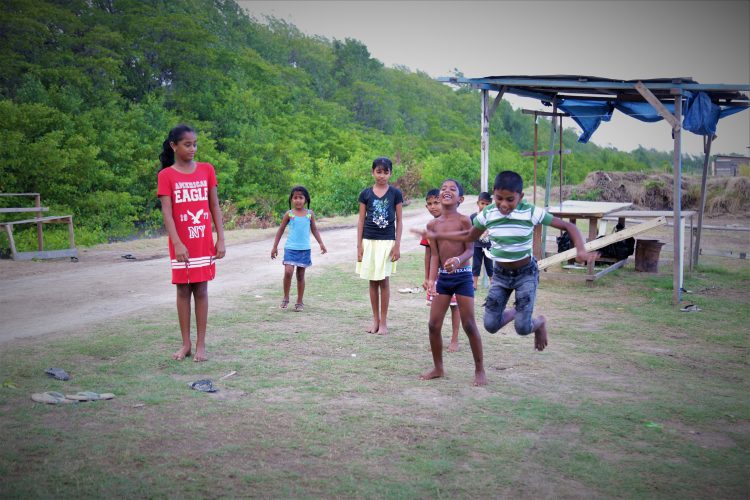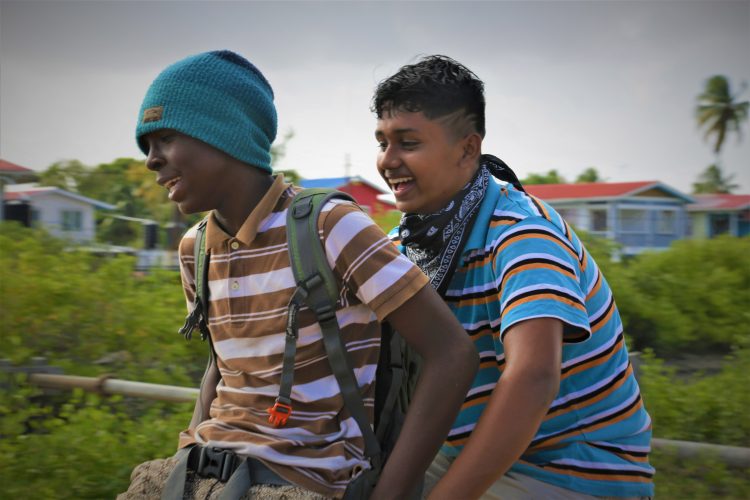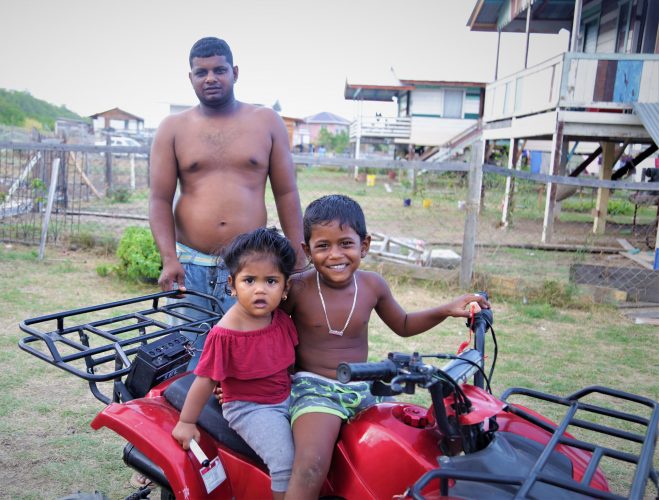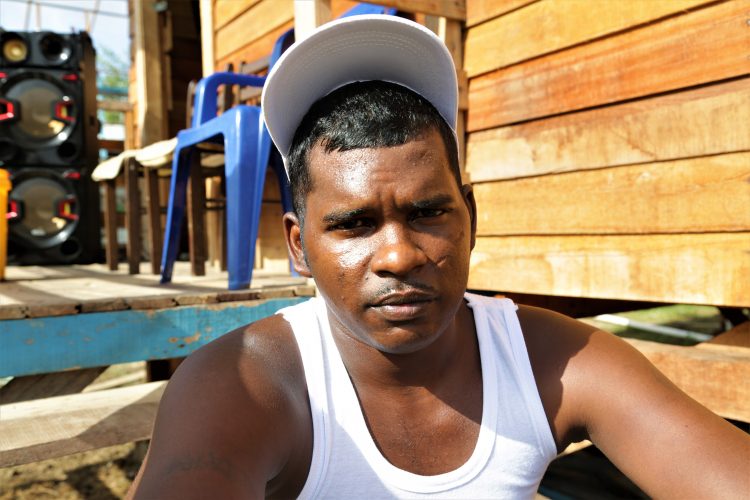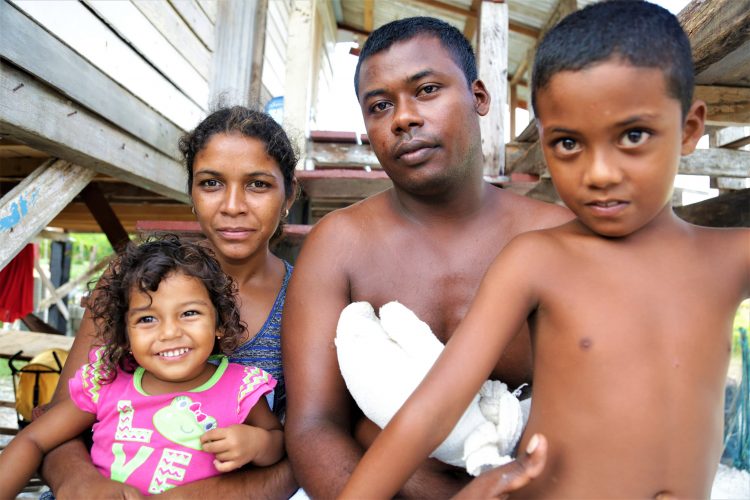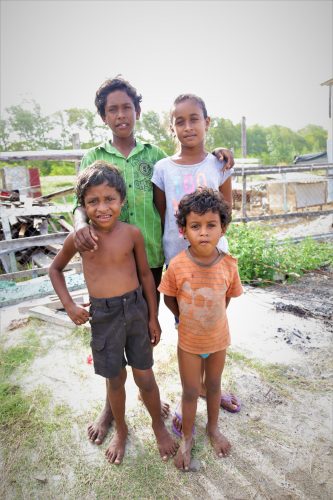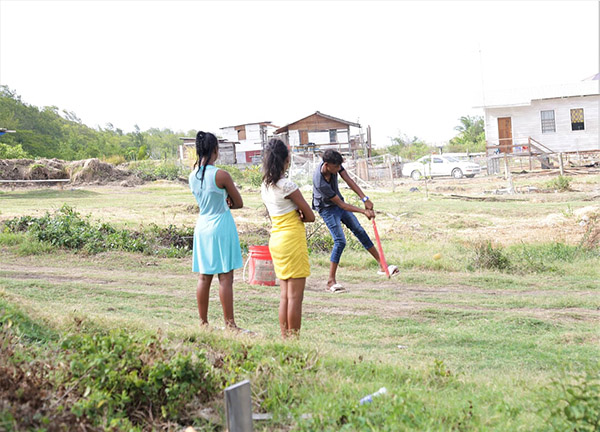Coldingen is on the East Coast Demerara right between Strathspey and Nonpareil. The village is believed to have more than 1,000 residents and most of them have access to all of the necessary amenities, those who are excluded mainly live on Sea Dam. Only a handful of houses on Sea Dam have both electricity and potable water.
As I stood there, a horse drawn cart passed by and its driver nodded in greeting. A short distance away, a fisherman sat removing several small fish from his cast net with his wife keeping him company.
Excited shouts came from a group of teenagers playing cricket, while their mothers and neighbours looked on. A few lots over, a group of smaller children laughed while one boy followed through with the order of “three crapo [crapaud] jumps”; they were playing ‘Mother May I’.
Patrick Coates stood outside his home chatting with his wife. He, like many others, lives on the government reserve. Coates hails from Montrose further up the coast. He is currently on a break from his job as a gold miner in the interior; he does a bit of masonry when he is out.
“It’s safe to live here,” Coates said. “I was never worried about that sort of thing. Sometimes me and me wife would sleep on the verandah just to get the breeze.” They have three children; two attend Strathspey Primary School and the eldest having written the National Grade Six Assessment is now awaiting her results.
The man explained that with no potable water available he would make his way to a friend who lives in Strathspey whenever his family is need. “We would glad for the place to develop, get a proper road and water. We glad for the lil rain that fall but the road does be nasty when it fall,” he noted.
Though there is a supermarket in the village, Coates and his family purchase their groceries from a supermarket in Strathspey.
Coates said that the recent Easter holiday saw the family flying kites at the seawall behind the village which Sea Dam leads to.
Twelve years ago, Chetram Motiram better known as ‘Sonny’ settled in Sea Dam, Coldingen. The taxi driver was washing his car when I showed up.
“I rented house seven to eight years straight. I go into housing for land, but I never get no response from them so come I end up coming here to live. I was the first man to come and live on the reserve and in the space of a year or two after other persons started building,” Motiram said.
He uses his car to bring water to his family from his friends in Strathspey or sometimes from his sister in Enmore. “People around here don’t want to give out water; if GWI come in is a problem. There are some Venezuelans who move here like two to three months ago and they get light and they get water,” Motiram said. “Police come on the scene and they said its Venezuelans and that they are refugees. They don’t have nowhere to live. They run a wire to give the people them light and put two stand pipe on the road for them. We live here for how many years and that not happening for us. As far as me see, the government that we have just need us to vote. So many years since we live here and so much children got to go to school and they not doing anything for us. When the rain fall, the mud does to be too much for them children to handle plus them people living at the back it worse for them. We need things to develop here for the children them sake. We need light and water and street lights would be really good; it does be very dark here in the night.”
As I continued along the dam, an adult had joined the children playing cricket; another set of children looked on. One girl passed by with a bunch of Basil. At the end of the dam, three children gathered around one of two pipes filling a bucket. I said hello but they did not respond. Their mother then appeared to translate; they are Venezuelans.
Antonio Asrayya came out to see what my visit was about. He was born in Venezuela and settled on Sea Dam 18 months ago. His parents who lived next door to him had left Guyana for Venezuela during the Forbes Burnham administration.
“Everything bin ah run nice. Nuff Guyanese go over there [Venezuela] and mek it and come over back at Guyana and mek them house,” Asrayya said. “Mammy dem mek big house ova deh. Dey nah bin had to pay fuh light or water or land. You get land free and yuh build yuh house. Some people dem build house free fah dem. I had me own house wid me family ova deh. I used to do construction. This man [Maduro] come in power and everything start guh down. We bin a struggle fuh a good while and we bin a study if fah come back to Guyana and everyday it a get moh worse, moh worse… People ah start bun down store and thief phone wah value $4,000 ova hey. Ova deh people ah eat mostly cassava and sardine. Who ah do de black market, dem ah eat good. How me deh hey suh me cyant get to handle money as me like because me nah know people and people nah know me ova hey.”
He explained that he came to Guyana through the Pomeroon River. He said paying rent in Guyana is very hard as he does not have a stable job. He learnt of persons squatting in Coldingen and joined them, making a small structure for his family. He said he had to build the place up with mud because the land was somewhat swampy. He and some other Venezuelan migrants parted the land among themselves. Guyana Water Incorporated installed two standpipes for the families and they pool their money to pay a monthly fee for the water.
He shared that not everyone had been pleased with their arrival in the country. He said that former Venezuelan president Hugo Chavez had been welcoming to Guyanese and treated them just as he did his own citizens and now it pains him that some Guyanese refuse to see the predicament they are in and are begging for them to return.
“Chavez bin a h help nuff Guyanese and see dem get dem ID card. We gat children and me nah glad if dey come wid dem machine and bruk down abee house,” he said. “How you gon feel if you in me situation and something like ah dah happen? Everybody love dem chirren and dey gon do de best fuh dem chirren. Dey nah gon go and sleep on de road. Deh gon knack up a lil thing fuh dem just like me. We want dem help we out. If dey give we a land self, whey we can live and help we out wid a job. Dey can give we lil wood and tools and we gon mek we house and wuk and pay dem back.”
Sometimes Asrayya catches fish at the seawalls or cleans the fishmen’s boats and is given fish to take home. He would also clean drains to get by when he doesn’t get any masonry work to do. He is paid $3,000 a day when there is work.
The man said that where he lives, it floods when it rains, pointing to his small wooden shack covered with old torn vinyl. There have been some supportive persons who when renovating their houses gave the families wood to build.
A part of Asrayya’s yard has a shed that was put up by a pastor to keep church for the families in the area. A Guyanese pastor along with a Venezuelan pastor would keep services with the migrants and would from time to time assist the families with groceries and clothing.
At another house made of plyboard and formboard Satrohan Khemraj appeared with part of his hand in bandages.
“I was from Little Baiboo in Mahaica River. I live in Venezuela 16 years now. I was 14 or so when I went to live there with my father. We went to work. When I first arrived over there it was real beautiful, a paradise,” Khemraj said. “It is still [somewhat] better because people don’t have to pay bills and they get free land. Fuel still cheap over there. Is just the foodstuff and getting jobs. If we had the jobs, we would have gotten money to buy the food. Food prices fluctuating too. We had a shop and I would go to Brazil to buy foodstuff to return and sell but when you come back, what is $100 today, is $200 tomorrow and $300 the next day. People would come and credit foodstuff and not be able to pay and when you refuse them, they threaten to kill you. I had my own business and my own carpentry workshop where I made kitchen cupboards and furniture, and everything gone right down. I had to sell out my stuff and my car just to buy food. Some mornings you line up from five in the morning to four in the afternoons and when you reach at the door to purchase the food, all the food done. Life became real hard. I had everything. Everything you could think about, I had it. I left everything and come away. I had to leave it and come to live without nothing here.”
At their lowest point, Khemraj recalled boiling mango juice and feeding his children adding that that was all they had for the day. They lived on fried fish and boiled cassava for many days. There were days he and his wife went without food.
The man complained that everything in Guyana is money when it comes to rent and bills, so he went in search of a piece of land which he found in Sea Dam. He filled up his yard and planted a kitchen garden.
However, recently, another squatter, a Guyanese living nearby was furious over him receiving electricity, though he himself was receiving electricity via the same cable. The two got into a spat and the other man’s wife took him a cutlass which the man used to attack him. In a bid to save himself, Khemraj raised his hand, resulting in three of his fingers being chopped. His neighbour has reportedly fled the area. He is currently on sick leave from his job at a water company where he sells water for them via the water truck service.
“I come here over two years with my tools to open back a carpentry workshop but on to now I can’t get a land. We really in need of a house lot. While it is nice living here close to the seaside, we have to move because officials said they have to put in a koker where we are living,” Khemraj said.
